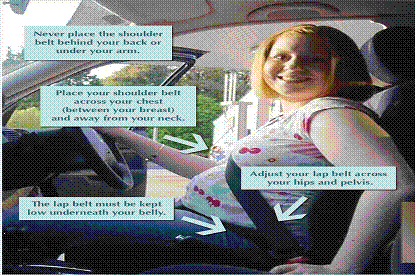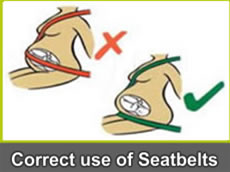From Castlebar - County Mayo -
Minding the Bump on the Road
By Noel Gibbons
7, Oct 2012 - 11:03
Motoring mothers often hang a sign in their rear window urging fellow drivers to be careful, but how many have already put their child's life at risk during pregnancy?
A new campaign is been launched in Co. Mayo to highlight the dangers to mums- to- be of the dangers of driving without wearing a seatbelt. This follows from a recent number of pregnant women who were admitted to Mayo General Hospital after been involved in RTA's which could had been life treating for both mum and baby.
The lives of thousands of unborn babies may be at risk each year because shocking numbers of pregnant women are misinformed about the importance of belting up in vehicles.
This is not a problem unique to Ireland or Western Europe, but a global concern. According to the Journal of the American Medical Association, car crashes are the number one cause of injury or death among unborn children, with one in 25 babies predicted to be in an accident while in the womb.
In a recent study in the UK of the pregnant women who don't belt up, one in five (21%) do so because they are worried the seatbelt might harm their baby. However, the baby is most at risk if the mother is injured or killed and wearing a seat belt helps to prevent this. Disturbingly, half of those who didn't belt up did so because it was uncomfortable.
The research shows that the pregnant women who wore seat belts reduced the risk of their foetus being killed or experiencing other serious complications in a vehicle crash by 84 percent compared to women who did not wear seat belts.
Consultant Obstetrician Dr Ulrich Bartels Mayo General Hospital said: Part of the challenge of this campaign aimed at reducing the traumatic effects a car collision can have on an expectant mother and her child is that there is very little recorded data on this issue. "You can take almost identical collisions and the baby will be injured and the mother will be fine, or vice versa,".
To complicate matters further, the injuries sustained will be affected by the nature of the collision and whether it involves a side, front or rear impact. Injuries might be classified as non-fatal, but if the connection between the uterus and placenta is slightly damaged, it could have long-term effects. "The feeling is that during a collision there are strong shear forces that separate the uterus and placenta, reducing the amount of oxygen and blood flow to the baby".
"You can have partial or severe separation, and babies can continue to have healthy gestation with partial separation. But with any separation there is some foetal distress and the closer it is to full term the greater the chance of premature delivery, as the shock releases hormones prompting birth; any baby born early is at risk of breathing problems."
Noel Gibbons Road safety Officer Mayo County Council said "I hope this campaign will dispel once and for all what the "myth" that wearing a seat belt is harmful for the foetus. Women radically overhaul their lifestyles to ensure they have a healthy pregnancy, yet by failing to belt up many are putting their own lives and those of their unborn babies in jeopardy. All mothers would be horrified at the thought of their unborn or newly-born child being harmed or even crushed to death in a crash, yet many are risking just this because of a lack of understanding about the life-saving importance of properly restraining themselves and their children."
Frances Burke, Childbirth Educator at MGH said: "A few simple steps taken by pregnant women and new mothers will save lives on our roads. It's essential that expectant mothers follow government advice and wear a seat belt - for all journeys no matter how long. Research shows that the majority of crashes happen on roads close to home so even for a quick trip to the shops, we'd strongly advise expectant mothers to belt up.
If a mother loves her unborn child enough to stop smoking, reduce her alcohol intake and eat a healthy diet, then wearing a seat belt correctly should be easy"
We would like to urge all the mothers- to- be to expect the unexpected - and wear those seatbelts!
• Restraints are necessary during pregnancy, just as they are necessary when you're not pregnant.
• You have a better chance of survival in a collision wearing a seat belt than not wearing one.
• Safety belt won't bring harm to your baby, which is encircled with amniotic fluid from all sides. It protects him from strong blows, which are dangerous for the foetus.
• No matter what the stage of your pregnancy, it is vital that you always wear a seat belt.
• By wearing a seat belt you are protecting yourself and your unborn baby in the event of a crash.
• Remember that it is illegal not to wear a seat belt unless you have a current certificate signed by a medical practitioner exempting you due to medical reasons.
• All pregnant women must wear seat belts by law when travelling in cars. This applies to both front and back seats - pregnancy does not in itself automatically provide exemption from the law.
• Even if your own injuries are slight in a crash, there is still a risk of losing your baby. Wearing a seatbelt reduces this risk.
• People who don't wear a seatbelt can injure other people in the vehicle as well as themselves in a crash.
· Talk to your midwife or doctor for any queries at your next check-up.
Always have a medical check-up if you do have a road traffic accident even when you feel fine!
© Copyright 2012 by Castlebar - County Mayo -

